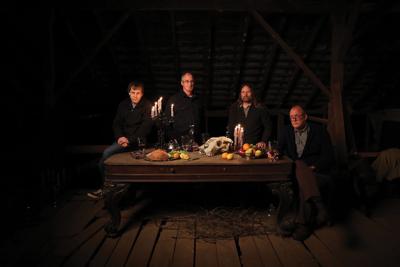
“It’s about how fucking insane the right has gotten — anti-science, anti-intellectualism.” Eric Bachmann and I are discussing Archers of Loaf’s first new record in nearly a quarter-century, Reason in Decline — its title, specifically. Contrasted with more cryptic work like the North Carolinians’ mid-’90s indie-rock touchstones Icky Mettle and Vee Vee, Reason meets the moment with its directness.
Back in the Clinton era, Archers “never used to print the lyrics” in their liner notes, Bachmann says, talking over the phone just before Christmas from his home in Athens, Ga. But there’s “a massive political bent to this one,” he explains, and it’s borne out in material like the Appalachian-folk-tinged “Mama Was a War Profiteer” and the soaring call-to-arms “In the Surface Noise.”
Archers are one of three pillars of a cacophonous, agitated strain of lo-fi rock ’n’ roll called, in punk parlance, the Chapel Hill sound; Superchunk and Polvo are the others. Bachmann describes the community in which he and bandmates Eric Johnson (guitar), Matt Gentling (bass) and Mark Price (drums) came of age as “all together, all connected.” The scene brought together players from Durham, Raleigh and Chapel Hill — the area colloquially called The Triangle, aka the Research Triangle for its trio of prestigious universities — as well as The Triad nearby, a more blue-collar area that includes Greensboro and Winston-Salem.
“I was a 22-year-old angry kid who hated Walmart,” Bachmann, now 52, says of his mindset in Archers’ early days. “I was just screaming — I didn’t know what the hell I was doing. Everything was just full-on. But people liked the way it sounded.”
Like U2 or Radiohead, Archers never had a member change. But tour burnout to the tune of 200-plus gigs a year did the foursome in following 1998’s ornery, claustrophobic, synth-accented White Trash Heroes. That’s despite a third wind given to the band by a then-unknown opener.
Remembers Bachmann: “We were done — so grumpy. It wasn’t fun. But we met this band At the Drive-In, who opened some shows for us. We were tired. They were wired. Polite. Kind. Showed up on time. Played on time. Their energy kept us going a little longer.” For evidence of Archers’ influence on At the Drive-In, check out “For Now..We Toast,” a ragged, dissonant gem from their 1998 statement-of-intent In/Casino/Out.
Bachmann is a nomad by nature — “I moved cities 13 times before I was even 11 years old,” he says — and following the band’s dissolution, he did stints in Seattle and Denver with his solo project Crooked Fingers. Then he landed in Athens, where he and his wife Liz Durrett — a fellow musician, and niece of the late, iconic Vic Chesnutt — are raising a 5-year-old son. Bachmann has also played with Neko Case, while Gentling has held down the low-end for Southern psych-folk greats Band of Horses since the mid-2010s. Johnson is a lawyer by day and a solo musician by night under the alias Spooky J; he and Gentling both call Asheville home. Meanwhile, drummer Price lives in Chapel Hill-adjacent Carrboro, where he manages a bicycle shop called Clean Machine.
Intermittent one-off reunions laid the groundwork, and a Springsteen-ian 2020 single titled “Raleigh Days” helped build the foundation for the new album. Archers headlined Cannery Ballroom in March 2020 with locals Peachy supporting and a whole slate of cross-country dates ahead, literally 48 hours before the world hit pause. Although no one is likely to call COVID a blessing, Reason in Decline likely wouldn’t have been thrashed into existence were it not for lockdown.
Parlaying the burst of inspiration that spawned “Raleigh Days” and its B-side, a faithful take on The Rolling Stones’ “Street Fighting Man,” into an album was not by design, Bachmann says, but, “when COVID happened, I got depressed, was stewing, and songs started coming.” A catalyst came in the form of “Screaming Undercover,” a standout of the new record’s A-side that he calls the first of this set of tunes “that felt significant.” Firing back up the equipment they’d used in the early days, Bachmann adds, “helped make it more Archers-like. Those old amps and guitars are a security blanket. They’re our sound.”
The end result is a blueprint for future comeback albums. From the first ringing chords of Reason’s opening salvo, “Human,” to “War Is Wide Open,” the piano jam that closes the 10-song set, it’s clear that the Chapel Hill sound is alive and well. It would be impossible to mistake this album for the work of any other band. Yet it’s also brighter-sounding and more streamlined than before, with greater urgency. The intervening 25 years are audible in its passion, focus and clarity.
“I’m still sort of shocked we were able to do it — to get a cohesive batch of music together after so long, that doesn’t sound like it’s trying too hard. But it still sounds like us, how we were — and also like the men we are now.”





